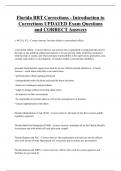Florida BRT Corrections - Introduction to
Corrections UPDATED Exam Questions
and CORRECT Answers
s. 943.10, F.S. - Correct Answer- law that defines a correctional officer
correctional officer - Correct Answer- any person who is appointed or employed full time by
the state or any political subdivision thereof, or by any private entity which has contracted
with the state or county, and whose primary responsibility is the supervision, protection, care,
custody, and control, or investigation, of inmates within a correctional institution
personal characteristics supervisors look for in new officers include abilities to - Correct
Answer- • work alone with little or no supervision
• perform tasks without getting distracted
• independently make decisions and stand by those decisions
• learn new techniques and procedures
• adapt to change without incurring undue stress
• be attentive to their environment
• be responsible for actions taken as well as the consequences of inaction
• interact appropriately with others
Florida Administrative Code (FAC) - Correct Answer- the body of law that oversees public
regulatory agencies
Florida Model Jail Standards (FMJS) - Correct Answer- standards set by the Florida Sheriff's
Association and with which all local jails must comply
Florida Statutes and FAC - Correct Answer- the requirements and rules set out for officers
who work for the Florida Department of Corrections and its entities are governed by
Florida Statutes and FMJS - Correct Answer- officer who work for county agencies and
facilities are governed by
,CJSTC - Correct Answer- Criminal Justice Standards and Training Commission
CJSTC was created to - Correct Answer- oversee the certification, employment, training, and
conduct of the Florida law enforcement. correctional, and correctional probation officers;
meets quarterly
s. 943.12, F.S. - Correct Answer- explains the Commission's duties as follows:
• establish uniform minimum standards for the employment and training of full-time, part-
time, and auxiliary law enforcement, correctional, and correctional probation officers
• establish and maintain officer training programs, curricula requirement , and certification of
training schools and training school instructors
• certify officers who completed a Florida BRT Program or who are diversely qualified
through experience and training and who met minimum employment standards
• review and administer appropriate administrative sanctions in instances when an officer,
instructor, or training school is found to be in violation of the Florida Statutes and
Commission standards
• set forth rules and procedures to administer the requirements of ss. 943.085-943.255, F.S.
• conduct studies of compensation, education, and training for correctional, correctional
probation, and law enforcement disciplines
• maintain a central repository or records of all certified criminal justice officers
• develop, maintain, and administer the SOCE for criminal justice officers
CJP - Correct Answer- Criminal Justice Professionalism Division
FDLE - Correct Answer- Florida Department of Law Enforcement
CJP and FDLE supports and assists the Commission's the - Correct Answer- the execution,
administration, implementation, and evaluation of the Commission's powers, duties, and
functions
s. 943.13, F.S. - Correct Answer- sets minimum requirements and standards that a person
must meet before being employed or appointed as a correctional officer
, nolo contendere - Correct Answer- when a person does not accept or deny responsibility for
the charges but agrees to accept punishment
SOCE - Correct Answer- State Officer Certification Examination
values - Correct Answer- principles or standards considered worthwhile or desirable; core
beliefs or desires that guide or motivate a person's attitude and actions
ethics - Correct Answer- moral principles that govern a person or group; based on society's
understanding of right and wrong
ethical behavior - Correct Answer- principled, value-based decision making that is practiced
daily
behaviors to avoid - Correct Answer- • stereotyping
• bias or prejudice
• discrimination
• assumption
stereotyping - Correct Answer- judging a group of people who are different from you based
on your own or others' opinions or encounters
bias or prejudice - Correct Answer- a strong belief or feeling about a person, group, or
subject, whether positive or negative, that is formed without reviewing all available facts or
information
discrimination - Correct Answer- the negative behavior toward a person or group that is based
on color, race, sex, age, religion, ethnic and national origin, disability, or marital status
assumption - Correct Answer- a notion, statement, or belief about a person, group, or event
that may or may not be factual
ethical decision-making tool - Correct Answer- an assessment tool that can assist you in
making decisions in difficult ethical situations




